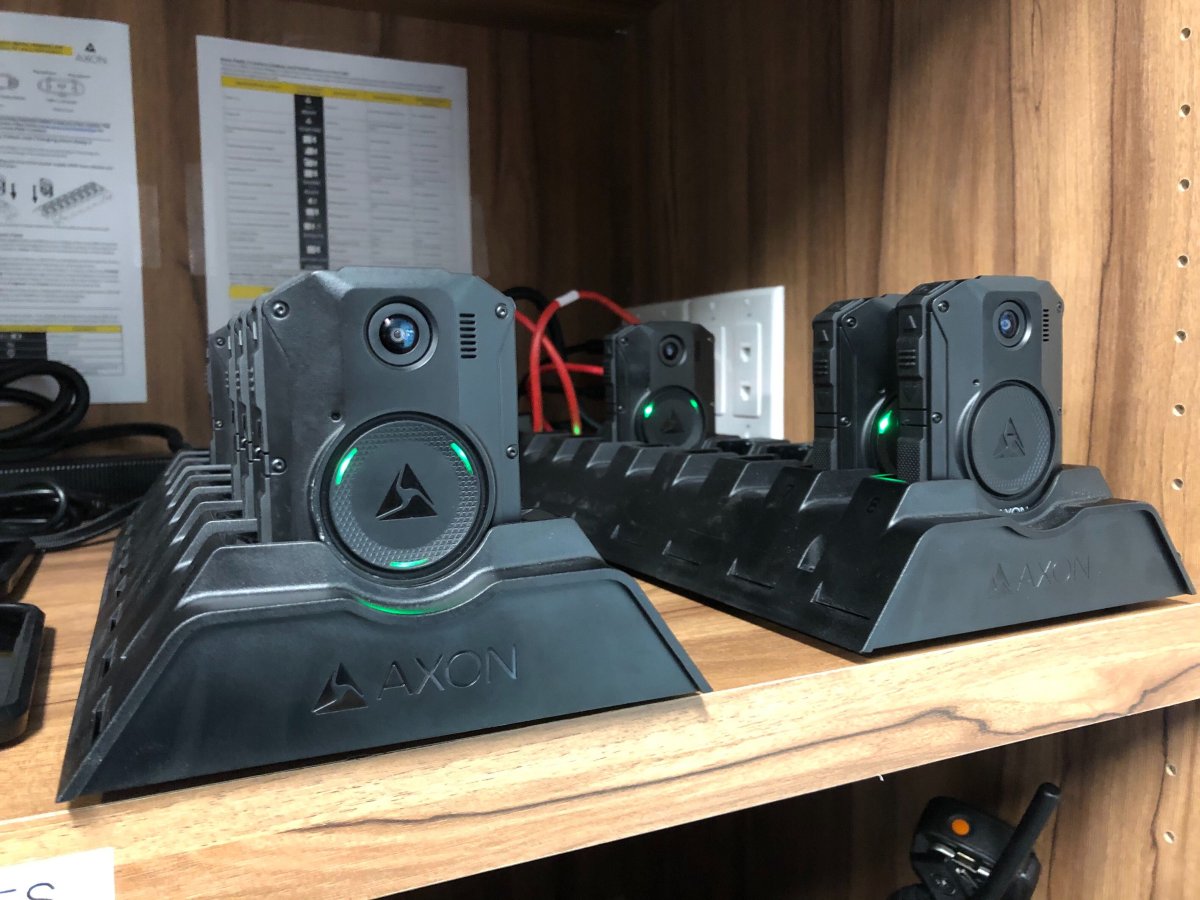A pilot project is now underway as the St. Thomas Police Service looks to see if body cameras will make a useful addition to the force.

The cameras are being provided as part of a 120-day free trial from Axon and its subsidiary Axon Public Safety Canada, Inc.
The policing tech giant is already responsible for supplying St. Thomas police with Taser brand conducted energy weapons.
The free trial provides St. Thomas police with a total of 12 cameras. The cameras will rotate between shifts, with half of them deployed to officers on community patrol while the other six recharge and upload their data.
While still early in the pilot project, which launched on Oct. 1, corporate communications co-ordinator for St. Thomas police Tanya Calvert says the rollout has been very smooth.
Calvert added that officers receive extensive training on the cameras prior to using them.
“Everything from the actual operation of the physical camera itself to the cloud-based platforms that you have to navigate through… there’s a lot of technology that has been learned,” said Calvert.
- Roll Up To Win? Tim Hortons says $55K boat win email was ‘human error’
- Bird flu risk to humans an ‘enormous concern,’ WHO says. Here’s what to know
- Halifax homeless encampment hits double capacity, officials mull next step
- Ontario premier calls cost of gas ‘absolutely disgusting,’ raises price-gouging concerns
Officers equipped with the cameras are expected to have them powered on for the entirety of their shift, but that doesn’t mean they will always be activated.
According to a list of frequently asked questions provided by St. Thomas police, officers are expected to activate the cameras before arriving at a call for service or when they start investigating an individual.
They are then expected to deactivate the cameras once the incident is complete or when the officer determines that continuous recording is no longer serving its intended purpose.
Officers equipped with the cameras are expected to inform the citizens they interact with that the camera has been activated.
“It’s a very narrow scope for when the camera would be turned off and basically it would be within a private residence,” said Calvert.
“If an officer is inside a private residence, the person who has invited the officer inside can ask for the camera to be deactivated.”
Calvert says the footage recorded by the cameras won’t ever be made public, save for rare exceptions.
“That would have to be under very serious circumstances where perhaps a suspect in a very dangerous crime needs to be identified who may have been recorded on one of the body cameras,” said Calvert.
St. Thomas police, along with the St. Thomas Police Services board, expect the cameras will build public trust, ensure officer and citizen safety and increase accountability.
While officers are hoping to see the cameras bring solutions, the Canadian Civil Liberties Association (CCLA) warns they may also lead to problems.
Brenda McPhail, the director of the non-profit organization’s Privacy, Technology and Surveillance Project, says access to footage recorded by the cameras is a top concern.
“It is very invasive to be on film the minute you start to communicate with an officer… People should always have access to their own images and the record of their own interactions,” said McPhail.
St. Thomas police have noted that a request for footage must be made under the Municipal Freedom of Information and Protection of Privacy Act (MFIPPA), but McPhail worries this may lead to a cumbersome process for citizens.
“Anybody who’s ever tried to use the access to information system knows that there are way too many exemptions and it takes forever,” said McPhail.
McPhail also takes issues with the idea that body cameras create a sense of transparency, adding that the footage captured does not paint the full picture.
“It’s going to be the police officer who controls what the camera sees by literally moving his or her body to direct the camera,” said McPhail.
“There is some discretion for when the officer does have to turn it on and when they’re allowed to turn it off… The policies around that and the enforcement to make sure that they follow the rules about when they turn it on and off is going to matter a lot.”
McPhail added that the footage is also subject to interpretation by various actors in the criminal justice system.
“We just have to guard against thinking that the film is the truth because it’s another piece of information that’s going to be interpreted by the same fallible, biased humans as all of the other information collected in an investigation will be.”
The pilot project is set to wrap up in January 2021, but Calvert added that it will take some time before a decision is made on whether to purchase the cameras.
The followup to the pilot will see consultation with a number of decision-makers along with a survey sent out to St. Thomas citizens.
“We don’t want to make our decision on what worked for someone else, we want to make our decision based on what works for us,” said Calvert.
“They only way we can make a good, educated decision is to go through the process.”









Comments